Inequality has emerged as one of the grand challenges for societies. It is often explained in terms of the intrinsic dynamics of capitalism or government policy. A new paper co-authored at Cambridge Judge Business School argues that the role of organisations in ensuring the persistence of inequality is just as crucial.

The issue of inequality is often linked to free market capitalism and government policy in such areas as tax, wages and educational opportunities. In contrast, there is little discussion of the role that organisations play in fostering and perpetuating inequality.
A just-published review puts the spotlight on organisations as places “where inequality is produced and amplified” – owing to hiring and other practices that go unquestioned thanks to three “highly institutionalised myths” that pervade organisational life. These are the myths of efficiency, meritocracy and positive globalisation.
“Organisations, far from being neutral entities, constitute bounded, rationalised and formalised spaces in which economic opportunities intersect with structures of exclusion and disadvantage,” says the paper published in Academy of Management Annals by academics based in the UK and Germany.
Organisational textbooks often misrepresent how people are hired, promoted and paid in organisations. Similarly, they hardly ever mention the numerous race, gender and class-based barriers to upward mobility that pervade organisations. A more honest appreciation of these dynamics is critical to understanding how inequality is produced and perpetuated, says the paper, which draws its insights from more than 400 articles, books and reports by government agencies and think tanks.

“The issue of who suffers from inequality has been well understood, but there has been little attention paid to the organisational mechanisms that allow inequality to persist,” says study co-author Dr Kamal Munir, Reader in Strategy & Policy at Cambridge Judge Business School, and Race & Inclusion Champion at the University of Cambridge.
“Our paper finds that inequality is fostered by organisational practices, and it is allowed to escape scrutiny thanks to three myths that are deeply entrenched in the organisational world and conceptualised in textbooks written about organisations and taught in business schools.”
The article focuses at length on the role played by these myths – defined as “widely shared cultural ideals and rationalised beliefs about how organisations ought to operate”. The paper suggests the three myths of efficiency, meritocracy and the positive nature of globalisation have become “pervasive in their influence” in allowing the enactment of practices and “taken-for-granted ways of operating” that reproduce inequality in organisations.
For example, the vast difference in pay between chief executive officers and ordinary workers is often justified by the existence of a neutral and efficient labour market which rewards the best performers. The cultural and social networks that marginalise non-whites, women and the poor are not taken into account in judging these disparities.
Likewise, the widespread belief that organisations are basically meritocratic wasn’t borne out by the study’s review, which found that entry, advancement and reward in organisations “often remains systematically non-meritocratic” and fails to reflect social and cultural factors. However, the myth of meritocracy is internalised not only by those who rise to the top, but equally by those who do not; the latter end up blaming themselves, suffering from low self-esteem and lowering their aspirations, cumulatively making the organisation less dynamic.
As for the institutionalised belief that globalisation is a positive and progressive force, a tide that lifts all boats, the review found that recruitment, promotion and compensation practices within multinational corporations engender new inequalities while strengthening existing ones. Far from being progressive, they reinforce local hierarchies and class-based social systems, taking advantage of workers, while offering attractive opportunities to the educated elite.
The authors conclude by saying that inequality has not received anywhere near the same attention at business schools as ethics and climate change. Highly sanitised pictures of organisations are painted in textbooks omitting the visible and invisible barriers that characterise organisational life for non-whites, women and the poor.
The paper – entitled “The organizational reproduction of inequality” – is co-authored by Dr John M. Amis of the University of Edinburgh; Professor Johanna Mair of the Hertie School of Governance in Berlin and co-director of the Global Innovation for Impact Lab at the Stanford University Center on Philanthropy and Civil Society; and Dr Kamal A. Munir, Reader in Strategy & Policy at Cambridge Judge Business School.

